
Pride
Hole Drummer Patty Schemel Interviews MUNA
Story by Jael Goldfine / Photography by Lindsey Byrnes / Styling by Mercedes Natalia
29 June 2019

MUNA was born in a USC course about African diaspora. Lead singer and songwriter Katie Gavin and guitarist Naomi McPherson met in class and, detecting a whiff of someone else "like them" with the shark-like instincts of two queer weirdos on a massive, fratty campus, quickly became family. Katie and guitarist Josette Maskin, both music majors, had already found each other in the school's DIY scene. The trio's first jam took place a year later: Josette and Naomi on guitar, and Katie working Ableton and a keyboard. Their debut EP arrived shortly after in 2014.
Three queer girls with cool haircuts who play guitar (in the age of Instagram and identity politics), MUNA was instantly tagged a "Cool Girl band," or a "queer girlband," or occasionally the "gay HAIM," as they gained buzz that led to a major label deal and an opening tour slot with Harry Styles. But MUNA has always been less interested in curating a zeitgeisty brand, than creating unflinchingly honest and emotionally generous pop of the highest quality. They succeeded last year on their debut album About U, which delivered lacerating hook after devastating lyric on 12 tracks of Robyn-style, life-affirming power pop that folds pain and heartbreak into euphoric synths and ecstatic geysers of drums. Theirs is pop as refuge, inviting listeners to face their pain too, made brave by the beat and the knowledge that someone else knows how they feel.
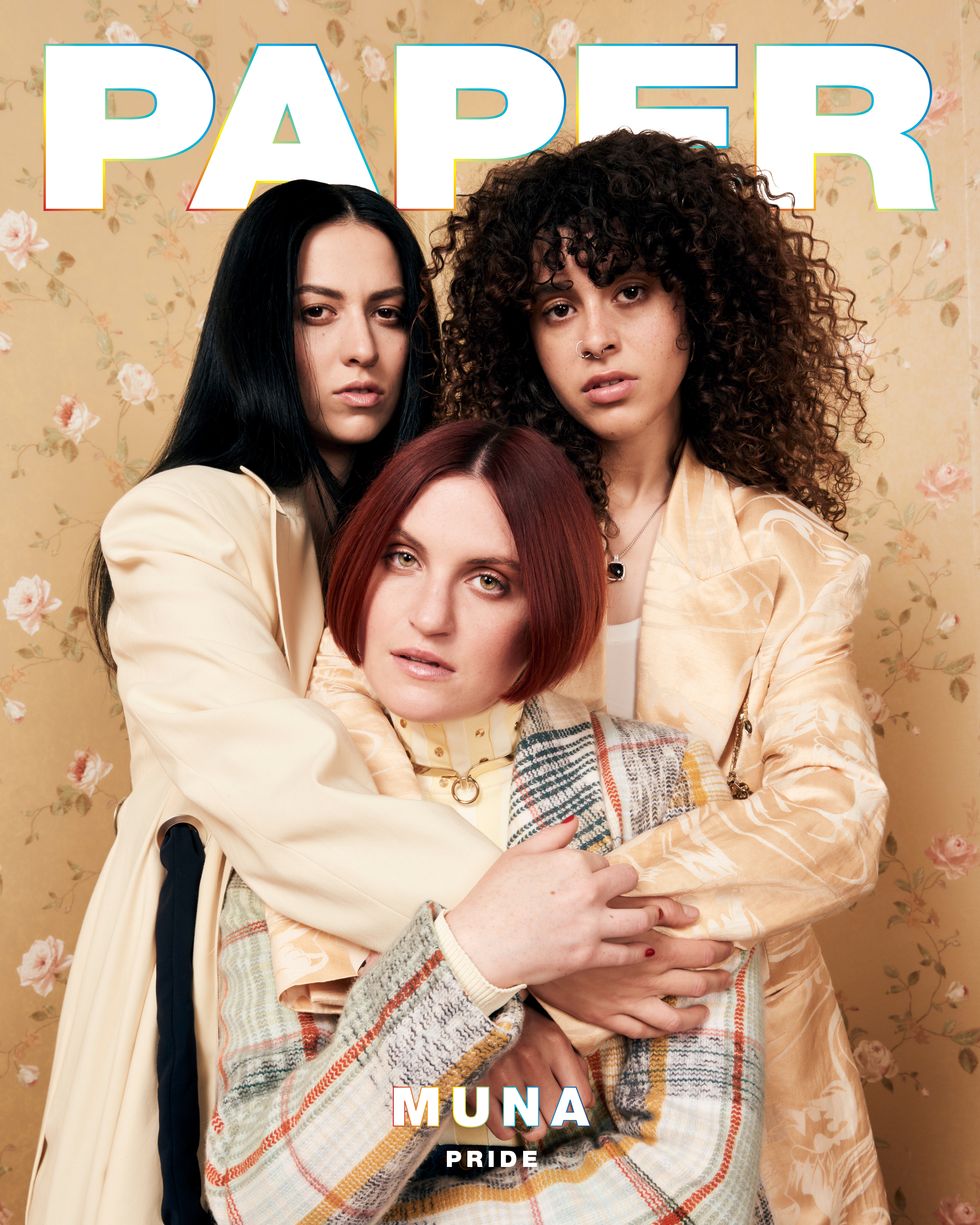
(On Katie) Turtleneck: SportMax, Jacket: Missoni, Denim: Chanel, Necklace: Alexis Bittar (On Jo) Top: H&M, Pants: Fendi, Jacket: Moon Choi, Shoes: Tuk (On Naomi) Suit: Acne, Tank: Alexander Wang for Uniqlo, Necklace: David Yurman
For MUNA, personal storytelling is a political response to the world — and the way they do it feels exhilarating and credible next to the empty virtue-signaling of most "political pop." While they've gained a reputation as defiantly outspoken artists (they declared Trump wasn't their president on their first ever late night appearance on Kimmel), MUNA's most radical statement is simply how they the tell truth about the ugliest sides of heartbreak and trauma in terms both universal, and specific to those society is most apt to isolate. Their breakout hit "I Know A Place," which has become a queer/coming out anthem, celebrates the dance-floor as a sanctuary (it was written for a friend suffering from cancer, and later dedicated to the victims of the Pulse nightclub shooting). "Loudspeaker" testifies to the Herculean strength of recovery ("Every time I don't shut up/ It's revolution"). On "Crying On The Bathroom Floor," they grapple with the complex relationship between love and abuse, a song they later used to define America's relationship to Trump's inauguration. It's a lot more powerful and difficult to make music that's a home for struggling and marginalized people, than to name-check an LGBTQ organization in a song.
MUNA's new album, Saves The World, out on September 6, raises the stakes of their personal-political popcraft. On the album, which (even more) painstakingly addresses family trauma, mental health, sexuality and heartbreak, the band quixotically proposes that we can "save the world" by saving ourselves. They realize this can be willfully misinterpreted as a Kumbaya-type sentiment, but they chose the title precisely for its counterpoint to 2019's fashionable nihilism. The songs make their own case for healing as an act of cataclysmic importance.
As the prologue for their windmill-slaying quest, MUNA returned to music a few weeks ago with one of the most honest self-love songs ever written (which captured the attention of bards of the subject, Mitski and Demi Lovato). On "Number One Fan," MUNA disarms the simplistic notion that acceptance is a place you arrive at, rather than a voice inside your head, forever in conversation with your ugliest doubts and fears. The song is a call and response between two parts of Katie's psyche: the one that believes "Nobody likes [her] and [she's] gonna die alone" and the part that would "give [her] life just to hold [her] hand." It's the brightest point on a dark album — a light to guide you through, they say — but to save the world, you have to face your demons first.
Patty Schemel knows something about facing demons. The drummer for Courtney Love's enduringly beloved grunge band Hole (during the Live Through This era), she was close with Kurt Cobain and struggled with drug and alcohol addiction during much of her life as a musician. She was also the first woman to cover Drum World Magazine in 1995, and one of the few openly gay women in music in the '90s. She came out in a 1994 Rolling Stone profile of Hole, saying: "I'm not out there with that fucking pink flag or anything, but it's good for other people who live somewhere else in some small town who feel freaky about being gay to know that there's other people who are and that it's OK."
Hole's influence on young artists today is nearly incomparable. While much of what the world knows about Schemel is grim Rock 'N' Roll trivia related to Love and Cobain, with the release of her memoir Hit So Hard in 2017 (which tells the story of how she survived), she's become recognized as a pioneer and luminary storyteller in her own right.
Katie compares meeting Schemel recently at a Planned Parenthood fundraiser to the circumstances of MUNA's genesis back at school. "You can't fuck around if you see someone else that might be like you. Like you did with us, at the Planned Parenthood thing," she says.
PAPER asked Schemel to interview MUNA for their Pride cover story. She met up with Katie, Josette and Naomi at the latter two's apartment in Highland Park, Los Angeles. Their interview became a wide-ranging conversation about everything from the rhythm section on Saves The World, to Joan Jett's queer legacy, to the best TV to binge while depressed, to their collective love of Imogen Heap. Between fits of laughter, long tangents and many moments of chaos over our speaker-phone, where everyone rushed to answer a question all at once, MUNA and Schemel traded stories about navigating queerness in music and finding artists who simply make you feel okay.
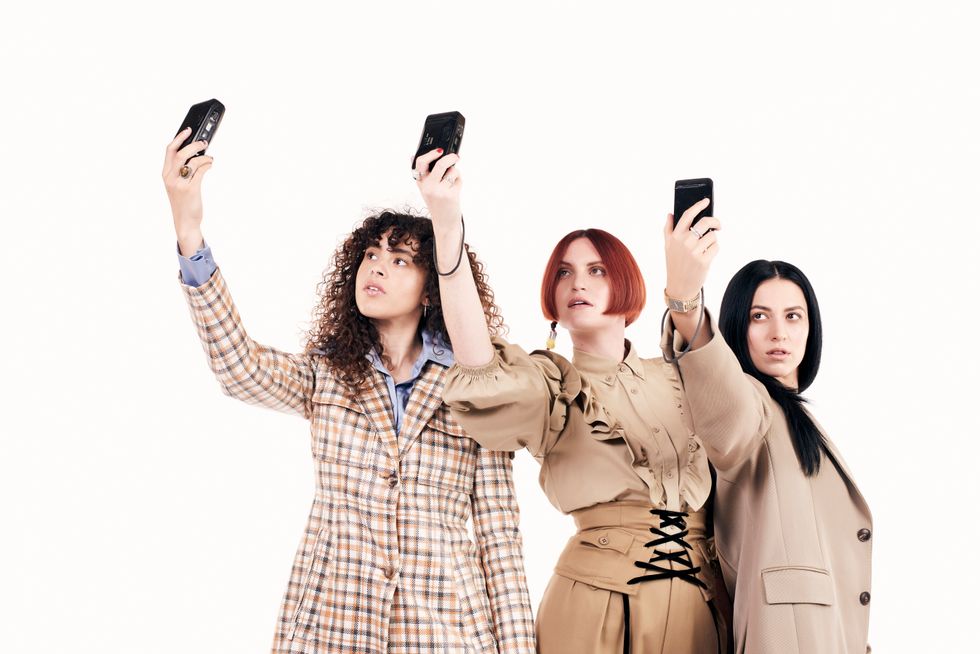
(On Naomi) Top & Pants: Moon Choi, Jacket: Bally, Rings: David Yurman (On Katie) Shirt, Pants & Belt: Miu Miu, Earring: Missoni, Rings: David Yurman & Tiffany (On Jo) Jacket: AMI, Rings: Bulgari
Patty Schemel: We initially met at that Planned Parenthood benefit. You met at school, right? Was it USC?
Josette Maskin: Yeah, we were real freaks at USC, to be honest.
Patty: Were you all playing music?
Josette: Well, [Katie and I] ran the music program at USC. Naomi was secretly playing music, but not in a scholastic manner.
Katie Gavin: It was a series of chance things that brought us together, because I transferred after a year in New York to USC, and I was studying music but when I was in New York, I also started studying some American history, and so I wanted to minor in American Studies and Ethnicity. I was in the music class of the kids who were a year younger than me since I was a transfer, so that's how I met Josette. I met Naomi in a class called African Diaspora, which was for what I then wanted to be my minor.
Patty: So it wasn't music-related, it was a totally different situation?
Katie: Yeah! I just thought she was cool. USC is such a specific environment that if you have an energy of being like... queer or just like...
Josette: Weird. You really stand out.
Katie: It actually fosters much quicker connections, because you can't fuck around. If you see someone else that might be like you, you're just like, "Who are you? Let's hang out." Like what you did with us at Planned Parenthood. So we became kindred pretty quickly. Then it took us a minute to start jamming.
Naomi McPherson: You had seen me and I had seen you before. We were talking and walking out of class, and you were like, "What do you do?" And I was like "I don't know, I do school. But I play guitar and stuff." And she was like, "Oh cool! You can be in my band." Then we didn't come back to it for like another year. And then we did end up being in a band together and here we fuckin' are.
Josette: What a cocky little bastard... [Laughs] She was puttin' the moves on in a serious way.
Patty: So, your band. Were you always electronic? Your music isn't organic drums. When you jam, how did it start? Like when you actually get in a room together?
Katie: So, Jo and Naomi had decided one night that they wanted to jam together, and they were both playing guitar. I had started learning how to use Ableton my last year of high school, and was working with it a lot my first year of college, just experimenting on my own. And I had like a MIDI keyboard. Naomi also was working on electronic music on her own. She would do like chopped and screwed remixes of different hip-hop songs.
Naomi: I just like slowing music way down. That's my kink [Laughs].
Katie: So the first time we sat in a room together, you guys were both playing electric guitar right? On like these little amps? And then I brought in my MIDI keyboard, had Ableton up and connected it to our speakers that we like listened to TV on. Then we had, I don't know a synth bass patch?
Naomi: Yeah, you were just doing synth stuff.
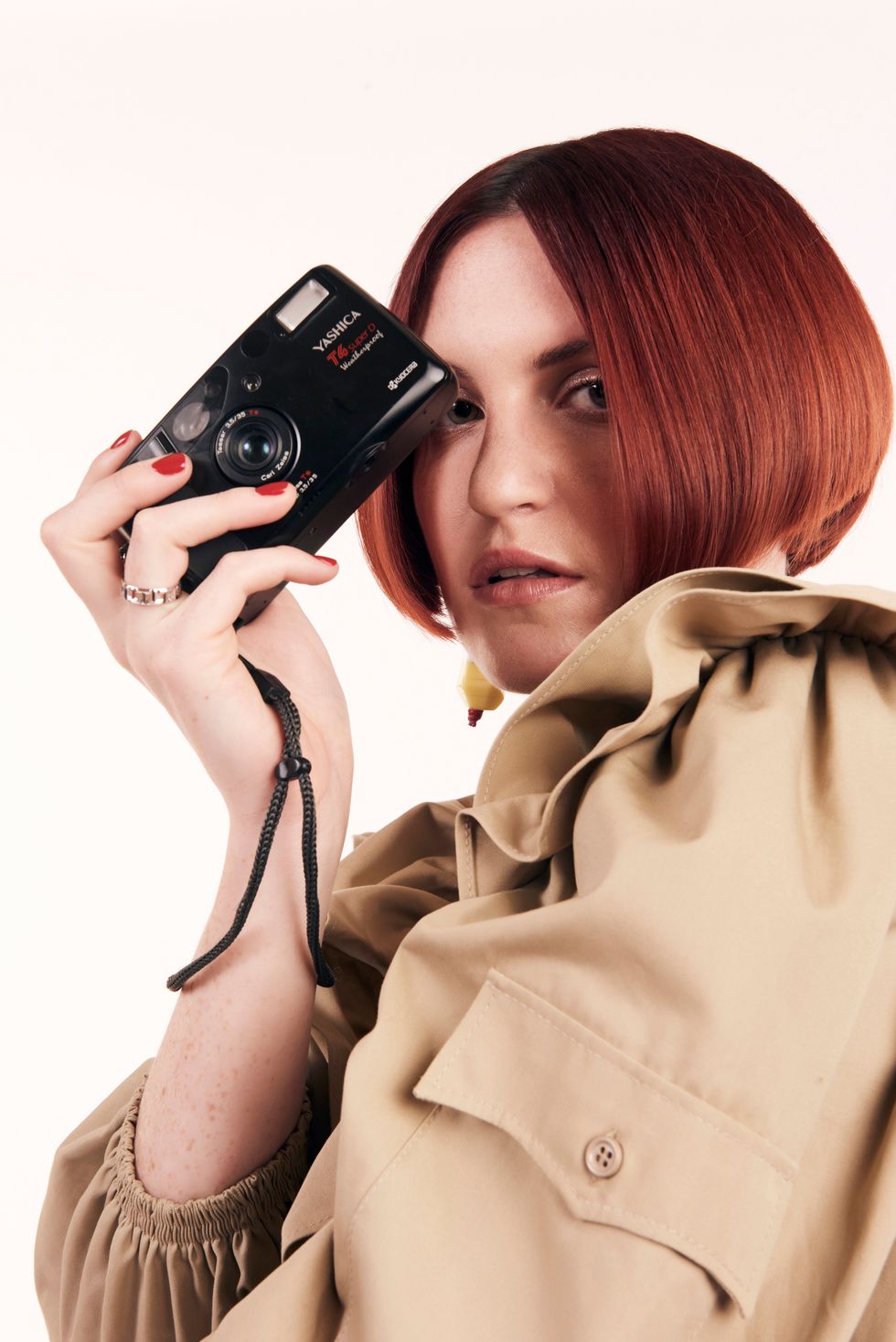
Shirt, Pants & Belt: Miu Miu, Earring: Missoni, Rings: David Yurman & Tiffany, Boots: Fendi
Katie: So that was the first way we jammed. 'Cause like, I can play guitar, but a three guitar jam? I had the idea that I wanted it to be poppier and dancier.
Patty: Did you bring in a drum machine?
Katie: I put the drums in after, but they were loops from Naomi. She gave me like 10 loops, and I feel like we used all of those for the whole first series of songs that we made together.
Naomi: Then I started using Ableton after, and — my dad's a drummer, and my grandfather's a sax player, they do jazz shit. I like rhythm section stuff a lot, so even though I'm not a drummer or a bass player and I feel connected to making drum parts, so I write a lot of drum parts.
Josette: Naomi writes pretty much all the drum parts.
Naomi: And our gracious drummer Scott plays them.
Patty: Yes! I met him.
Josette: Yeah, he's great [Laughs].
Katie: This record, in the studio, every song has some element of organic drums by Scott, except for the weird interlude towards the end.
Patty: So he came in and played?
Katie: Yeah, even the electronic stuff, when we sample or replace or double, it still has his groove in it.
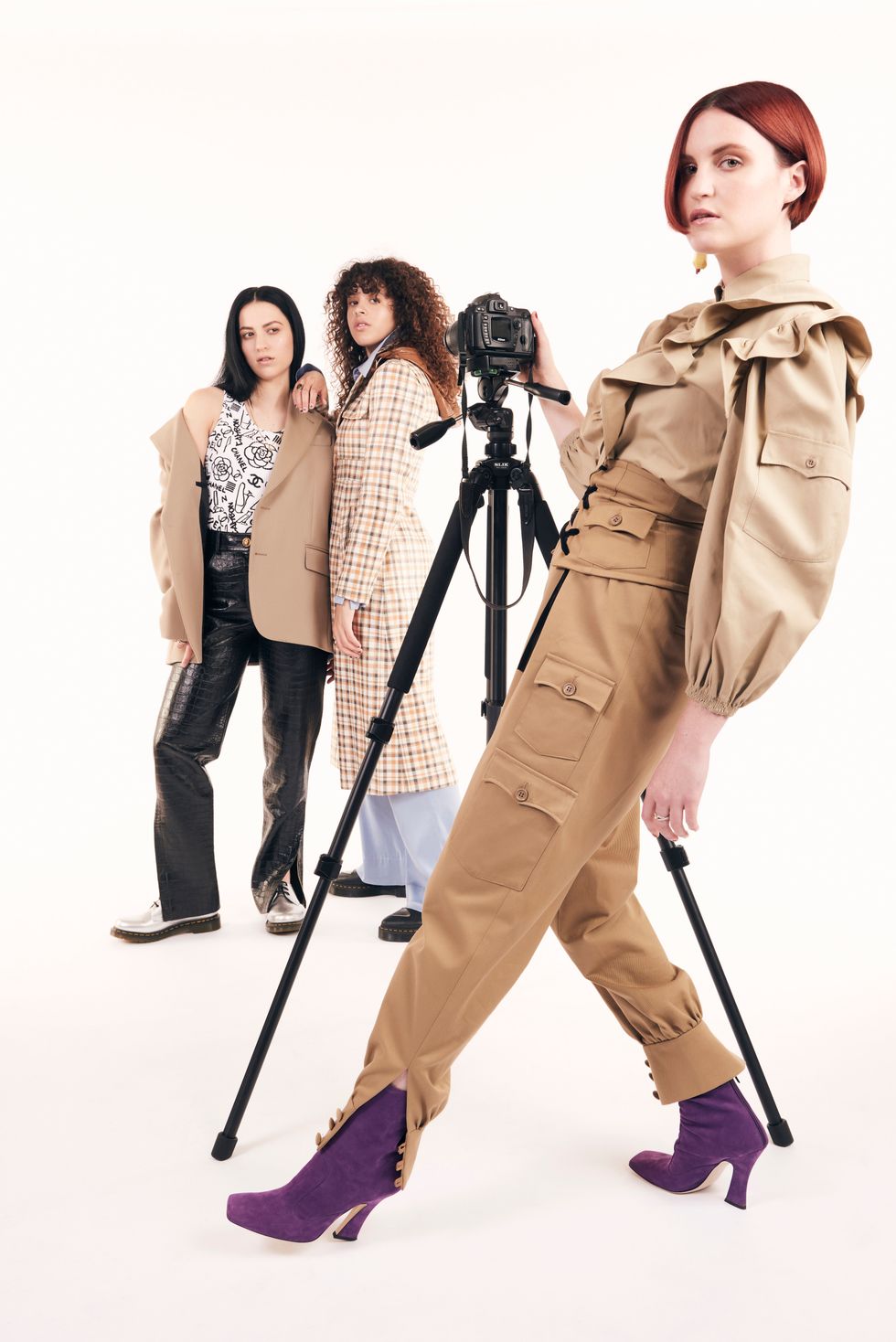
(On Naomi) Top & Pants: Moon Choi, Jacket: Bally, Rings: David Yurman, Shoes: Dr. Martens (On Katie) Shirt, Pants & Belt: Miu Miu, Earring: Missoni, Rings: David Yurman & Tiffany, Boots: Fendi (On Jo) Jacket: AMI, Rings: Bulgari, Shoes: Dr. Martens
Patty: Yeah! There's one, maybe it's the second or third song on the album? That has a half-time beat.
Naomi: On this record? "Who?"
Patty: Yeah, yeah! That's the one.
Katie: It's so funny that you've heard it...
Naomi: We're just finishing the masters right now, so it's crazy that other people have heard it.
Patty: I really like "Loudspeaker." That song's so great.
Naomi: Fuck, thank you so much.
Patty: I'm so excited about what's next. Like just the idea behind the first single, saying "be your own fan and stick up for yourself," making the decision that "I like me" and I'm going to turn it around. So, was what was that about?
Katie: It was about getting to know that character of the fan, for me. Our first album cycle brought with it so much joy and excitement, but it was also a period of time where I was in close contact with my biggest inner critic, where it's like, if something good is happening, you have this voice in your head that's saying "I don't deserve for this to be happening, or people are going to figure out soon that I'm a fraud."
"Number One Fan" isn't about telling that voice to fuck off. That voice is always going to be with me. It'll be with me through the whole cycle. And them too. But it's getting to know the alternative character in your head, that is supporting you. As we made this record, we had the privilege of having some downtime in Los Angeles to reestablish our habits as human beings, we just had time to... just like, go to therapy and do the work on yourself that a lot of people need to do in their mid-twenties. It's been a really affirming process. I needed to get to know the part of myself, that feels like I deserve all of this.
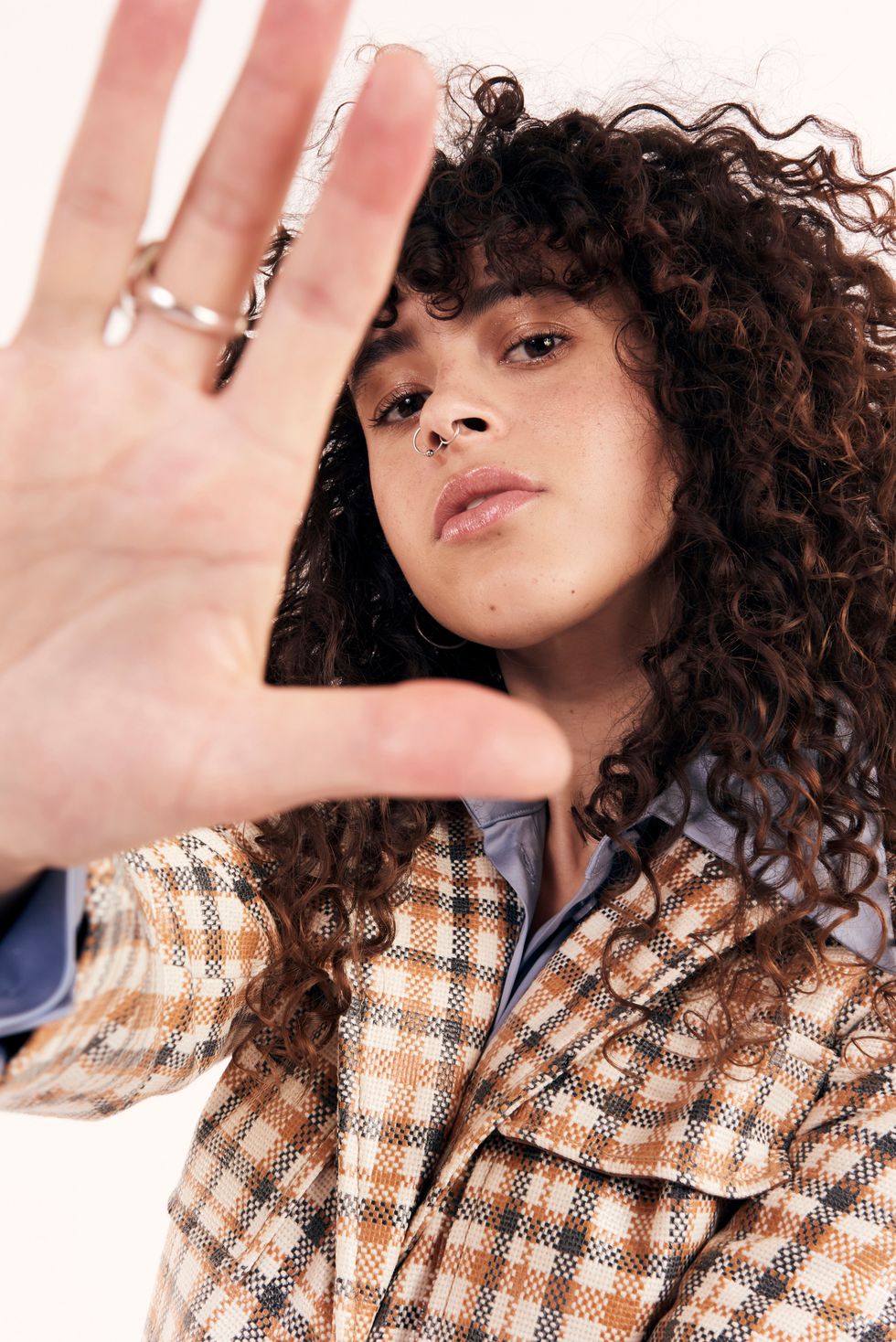
Top & Pants: Moon Choi, Jacket: Bally, Rings: David Yurman, Shoes: Dr. Martens
Patty: Yeah. The self-examination you need to say "I'm worthy."
Katie: Yeah! Especially that I'm worthy of this responsibility that comes with being an artist. And we're going to cheer ourselves on no matter what. Because that's really the only thing we can control. Like, I don't know how people are going to respond to this record, but I can control the fact that I am being kind to myself about what I've made. It's a hard thing to be a creative person in the public.
Patty: And the fact that... Everybody here's gay, right? How do you all identify?
[Laughter]
Katie: I identify as queer.
Naomi: We all identify as queer, but I'm like pretty fuckin'...
Katie: Naomi and Josette are...
[Laughter]
Naomi: We're pretty fuckin' gay. Actually, yeah.
Patty: [Laughs]
Josette: Katie is...
Katie: I've always been confused, like...
Naomi: Katie's a bisexual free spirit, for our fuckin' contemporary times. You're like "it doesn't matter who or where."
Patty: Yeah, yeah [Laughs].
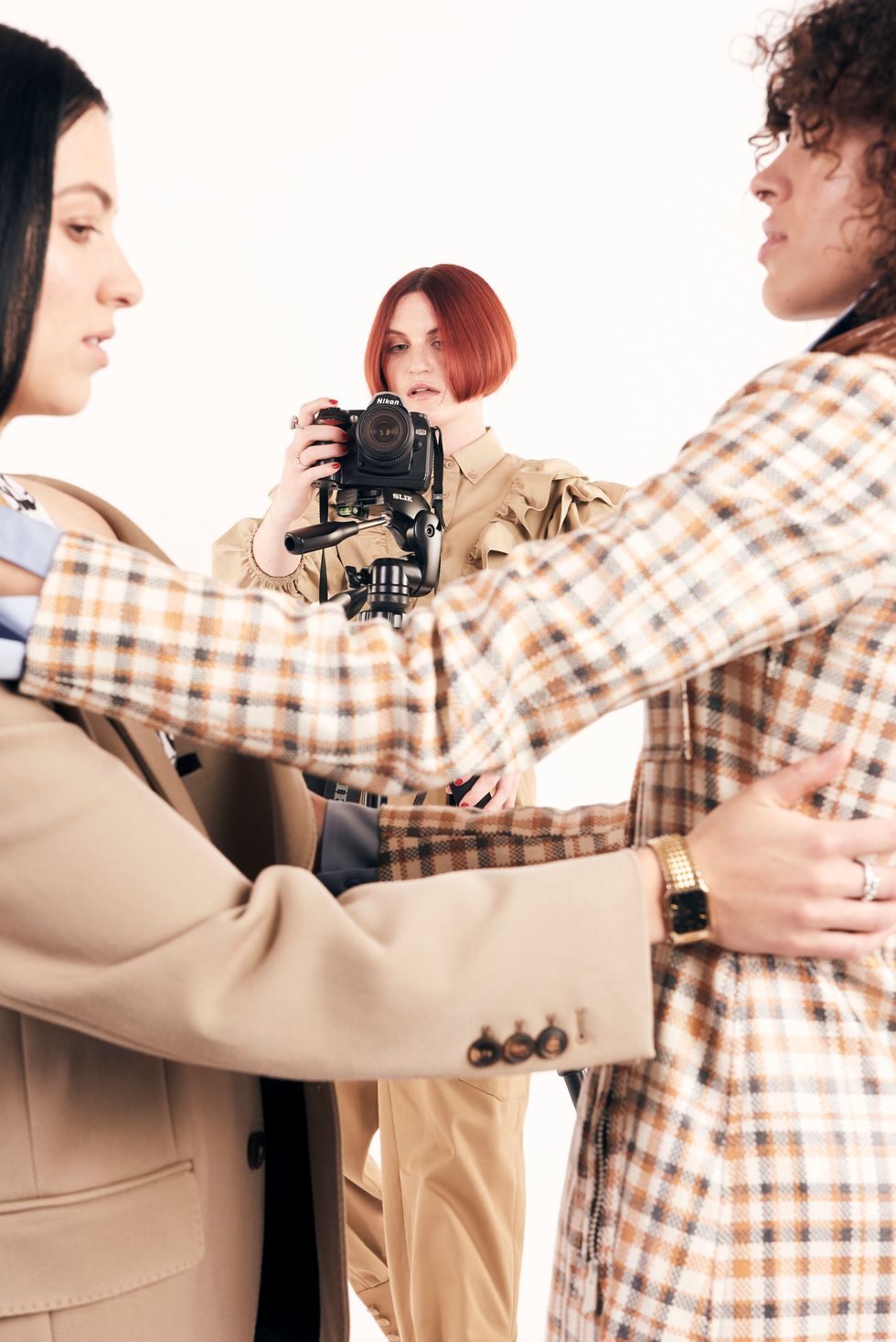
(On Naomi) Top & Pants: Moon Choi, Jacket: Bally, Rings: David Yurman (On Katie) Shirt, Pants & Belt: Miu Miu, Earring: Missoni, Rings: David Yurman & Tiffany (On Jo) Jacket: AMI, Rings: Bulgari
Naomi: And I'm like... it kinda matters.
Patty: That's the thing about right now! It's like you can create and write about whoever. Whoever your singin' about is whoever you're singin' about. But I remember being gay growing up and looking to music, and thinking, "Is... Joan Jett talkin' about a girl or...?
Naomi: [Laughs] Right, like what's going on with her...
Patty: And just clinging onto whatever I thought was gonna... if there was like the slightest thing, like "Oh, David Bowie's dressed like a girl." And just attaching myself to that, because I needed something. And it made me feel okay. Now, it still feels good, to hear someone openly queer and you're talking about those things, and for that kid to hear your music and go "sigh, I feel alright."
Josette: I feel like, no matter what time it is, feeling outside the norm, given everything our society's based on like heteronormativity and the patriarchy, no matter what time in history, I think everyone needs to be affirmed in their identity.
Naomi: Even for us, it was a discussion. When we were forming MUNA, we were like "Are we gonna' be out?" I mean, there were queer bands that I knew of growing up, but not as many as there are now. Not as many giant, famous people who were out at the time. You still were kind of marginalized from the mainstream music world, if you were gay. Now it's changing, but even then, we were having conversations. Jo and I were not keen on being out, we weren't sure that that was going to be helpful to us. We were scared.
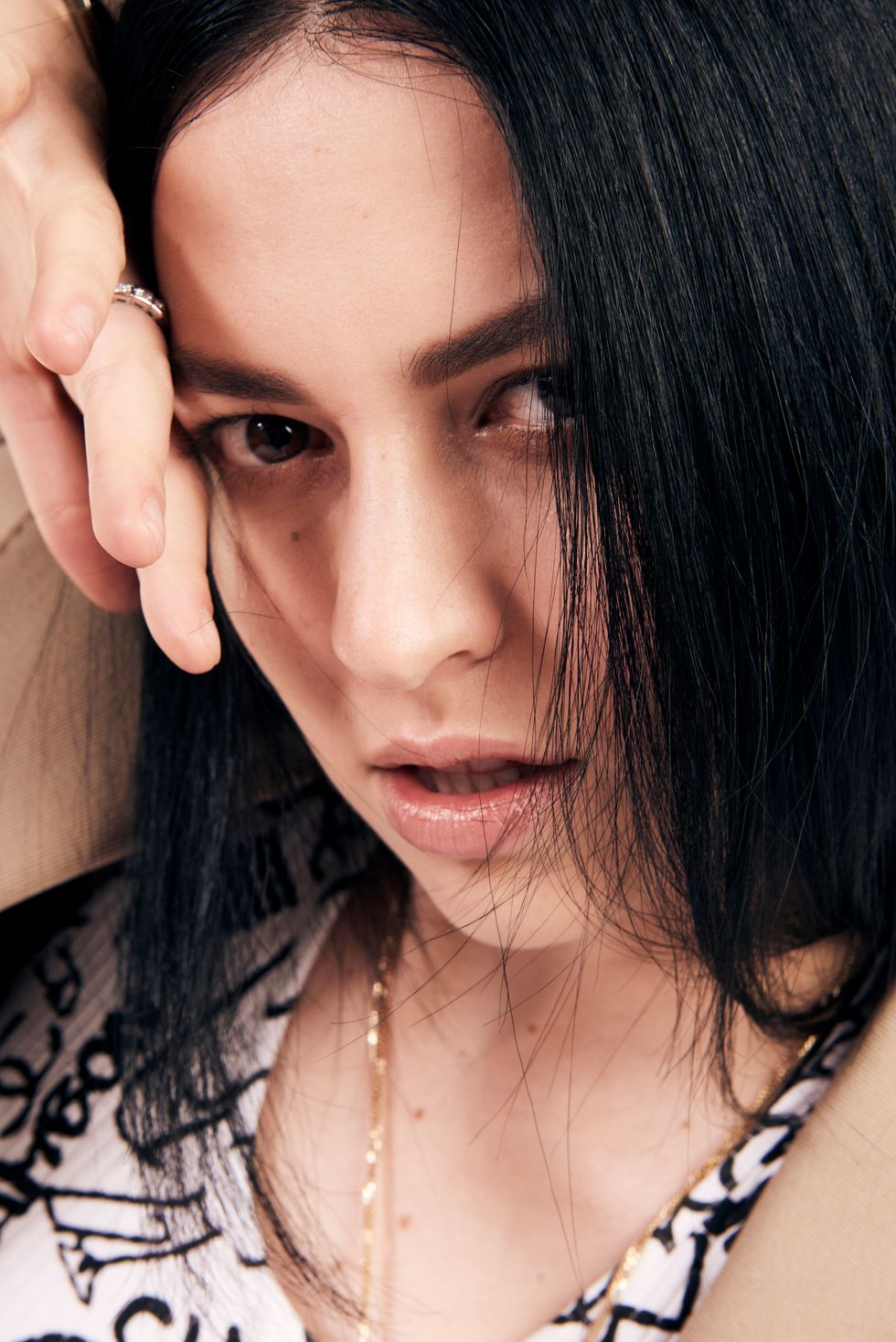
Top: Chanel
Patty: To address it?
Josette: Yeah. Katie definitely did, and I'm so glad, obviously, that we did what we did, because it affirmed me as a person. At least my apprehension, and I can't speak for you, but for me it's like "I identify as 'she' but being on a spectrum of being queer and nonbinary, to some degree," Being out as a band, really maybe me feel more at home in that identity, too.
Katie: We just knew that we were going to have to talk about it.
Naomi: A lot [Laughs]...
Josette: In a way, it's doing the same thing "I Know A Place." "I Know A Place" is like "we're here, we're queer." "Number One Fan" is the new version of that: us coming to the challenge of saying, "I love myself, I'm working on myself, this is who I want to be."
Naomi: It's funny, "Number One Fan" is actually a lead single is so deceptive as to what the rest of the record is like, emotionally. But it's a good way to frame the narrative. Because I mean, we all struggle a lot. With liking ourselves and making healthy choices and living healthy, non-destructive lives.
Patty: What is the rest of the record like?
Naomi: Sad [Laughs].
Katie: Even with "Number One Fan," there are really despairing moments, and then there are some parts of the song that are really hopeful. As we've started talking more about the record, and I still feel like we're learning how to talk about it. It's interesting framing it in the conversation of coming out, because I feel like... My job as a songwriter is to keep "coming" out in a bunch of different ways.
Patty: Right! That's such a cool way to put it.
Katie: Do you know what I mean?
Patty: Yeah!
Katie: I've had to continue to live life, and try to depict my experiences in an honest way in songs, and that leads to coming out as a bunch of different types of things. It's a heartbreak record. But it's looking at heartbreak as an obsession with an unavailable person, as a portal for a deeper pain that I think has nothing to do with—
Patty: The literal thing. It's just the search and maybe, that disappointment in a general way?
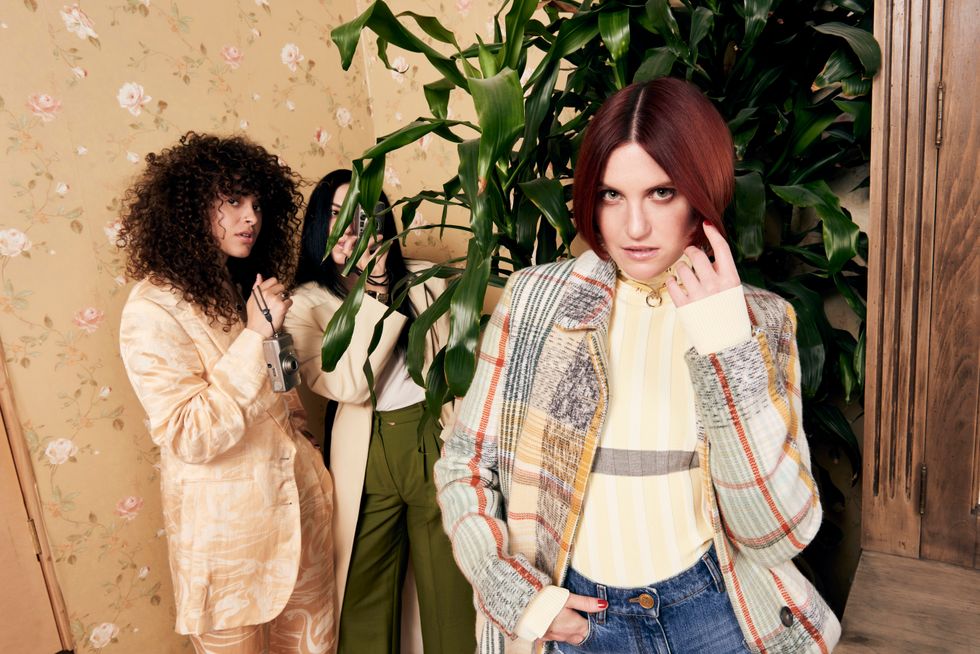
(On Katie) Turtleneck: SportMax, Jacket: Missoni, Denim: Chanel, Necklace: Alexis Bittar (On Jo) Top: H&M, Pants: Fendi, Jacket: Moon Choi, Shoes: Tuk (On Naomi) Suit: Acne, Tank: Alexander Wang for Uniqlo, Necklace: David Yurman
Katie: Maybe, I don't even know what it is! This record is probably the most personal piece of work I've ever been a part of creating. There's even stuff on the record that's about my family history. I think some people will interpret it as patterns that get started because of maybe childhood trauma. Some people might interpret it as patterns that we enact using things like drugs or alcohol or people to deal with mental illness like depression or anxiety. Some people might say this record is a depiction of a person trying to cope in a world that seems to be completely insane, because we're ignoring that we're killing our planet, and we're ignoring atrocities and human rights tragedies. I think all of those readings are true.
Patty: Does it feel good now? Giving birth to your second child.
Josette: It feels good. But when we finished it felt so good, but it was also like "are we actually done?" Right now we are just crossing the next threshold of what we have to do. It's never ending. Like it's finished, but it actually just began.
Patty: Right, it's like, here's the songs and the message and we're gonna unleash it.
Josette: Now we just have to figure out how best to communicate what we have been creating for two years. And make sure that gets across to people, because, that's the whole intent.
Patty: Here's a not so serious question. In the flow of writing and creating, did you guys watch a show or listen to something that was especially, like "Oh my god, like the thing that's like, I just need to watch an episode of Real Housewives right now" or whatever it is.
Naomi: Oh my god, so much.
Josette: We watched some crazy shit at the beach house, but not intentionally.
Katie: Vanderpump Rules?
Patty: Ohhh yes!
Patty: Right. I just caught onto Real Housewives, just now, so late.
Josette: It's not like the show is bad or anything, I don't condone it because it's like, you black out into it.
Patty: Oh you have to, you have to check out.
Katie: I relied on so many shows to get me through. I think I rewatched Friends? And I rewatched The Office.
Patty: This is always such a weird, tough question, about listening to other music, and what's influenced the album. I mean, I know... do you guys like Imogen Heap?
Katie: Yes!
Patty: And, is it Frou Frou? [Imogen Heap's side-project with Guy Sigsworth]. There's one song on that... "Delicious"? There's one song that makes me think of you guys.
Katie: There's so many fucking bangers. Our favorite song on that record is "It's Good To Be In Love."
Naomi: That song's fucked up.
Patty: Moving into, thinking about tour, how you're going to present your record, what does it look like, and all that?
Katie: That's funny, this phase of lives that we're in right now. Because this morning, we were just meeting with this potential bass player, and beginning to talk about all these things. And we're also in an interview, being asked about it. Everything is happening all at once.
Josette: We don't know yet. We're really in the thick of figuring things out.
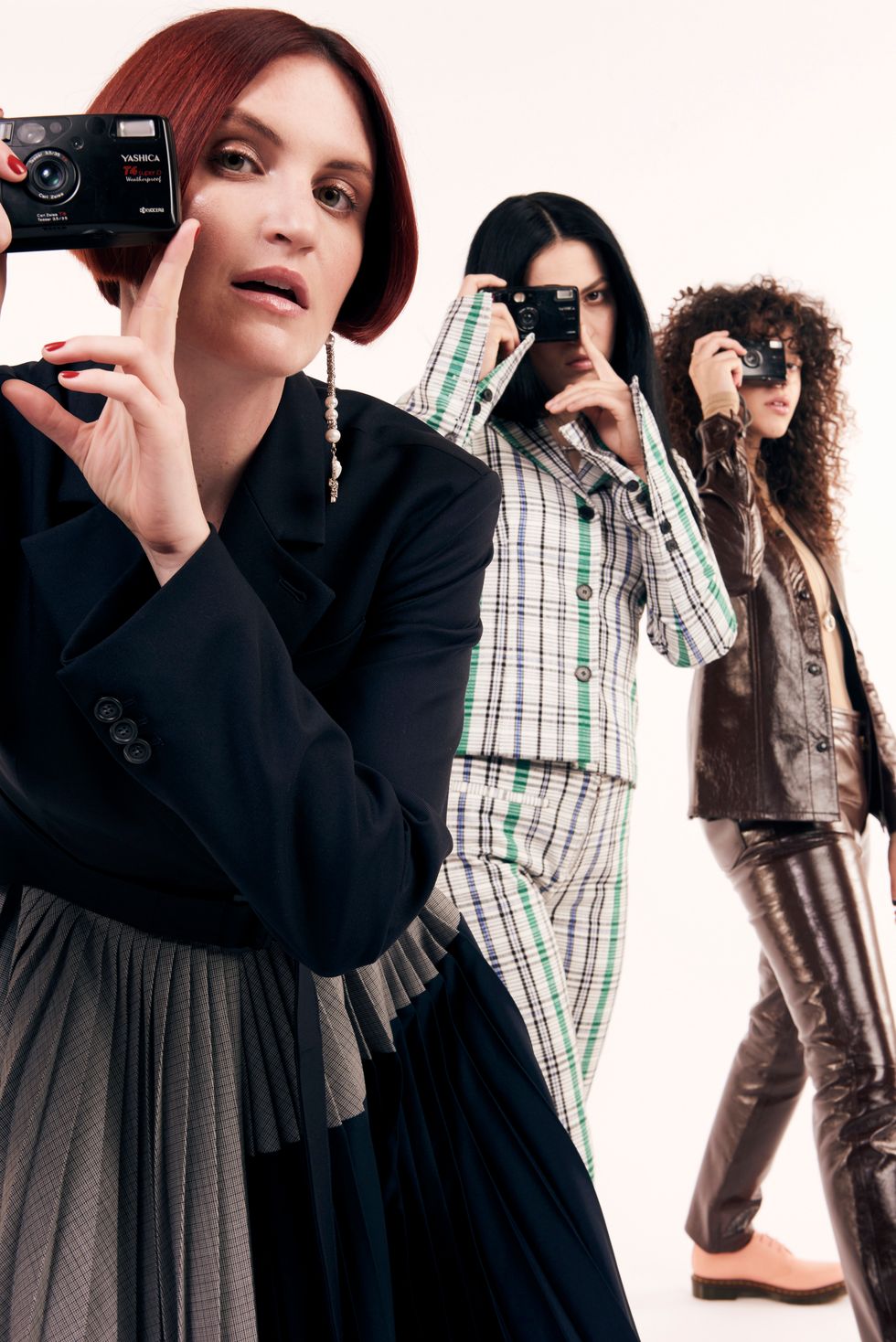
(On Katie) Dress: SportMax, Earrings: Chanel & Alexis Bittar, Rings: Bulgari (On Jo) Suit: Kenzo, Necklace: Bulgari (On Naomi) Jacket & Pants: AMI, Top: Acne, Necklace: David Yurman, Rings: Cartier & Alexis Bittar, Shoes: Dr. Martens
Katie: We did change our style and our look a little bit for this cycle. Just because it's changed in our lives.
Naomi: It's a little more chill.
Katie: It's a little more chill, it's a little more softer. I've started wearing like a lot of long skirts, and I did have somebody ask me like "Oh, what are you doing to do when you're like jumping around." And I thought about Courtney, because like "Who fucking cares, dude?"
Patty: No one! [Laughs]. Well, I will tell you, we did think about what we were gonna look like way before she did.Naomi: I mean, the look conversation was a serious part of the record.
Katie: Yeah, it really matters.
Naomi: We were like, we gotta do something that people aren't doing yet. Also, like me and Jo are such masculine people, in certain ways. I was just sick of showing up to photoshoots and getting put in tight-ass clothes, like I want to wear literally what I'm wearing right now.
Patty: Yeah! So, When you think about what you want your stage to kind of look, are you influenced by anything, are you like "Ooh, I kind of like what Imogen Heap's doing." Or, "I kind of like the simplicity of..."
Katie: We've been working with our friend Isaac. He shot the album cover and directed the "Number One Fan" video. We spent a lot of time with him planning that stuff, taking different influences, and I think there are certain worlds that we love. Naomi has really gotten into the Brit-pop world.
Naomi: I just like how baggy their clothes are.
Katie: Honestly, we're influenced by the grunge world as well. On top of that, there are film directors like Wong Kar-Wai. We really like the lighting. Basically, we want to show up and give people an immersive experience, so whatever we can afford to do visually. We're signed to a major, but we love being as involved as we can, like we're DIY in our hearts.
Patty: It's cool that you guys do your own programming. That's something girls need to know more about.
Naomi: It's not the easiest industry to break into as women, because it can be such a fucking toxic environment.
Katie: That's why Ableton is amazing, because you can just fuck off and go just hole up off in your bedroom and make a fat beat. That's basically why I started learning Ableton. I mean, I had a high school boyfriend who used Ableton that how I knew about it. But I was so tired of writing songs and men taking them and doing something I didn't want to happen to them. I was like, "I'm not going to do this anymore. I'm just going to learn how to do it myself." Most of the women I know who produce, that's why. They're just like, "I have my own ideas."
Patty: Right! You can have an entire string section. It's amazing.
PAPER: You guys have called yourselves "punks who make pop."
Naomi: I feel like it's just about the spirits that are inside of us as human beings. We have the angst and the political angle and the feminist frustration and all these things that are emblematic of punk. But, we don't make punk music. It's an energy and an angle. What we chose to talk about and involve ourselves in. We have bit of an anti-establishment, DIY spirit inside of us, even though we're a fuckin' pop band.
Katie: When I think about punk, I think about honesty. I think about... just the sense of like this person is not lying to you, in the way that so many other people are lying to you. I think that that's a tenant, upon on which this band was founded. Being in the room with Patty, makes me think of, whatever your instrument is, there's a way of attacking it. That's always been our approach.
Josette: We identify with pop music because pop is what is popular. Pop isn't actually a genre. Pop is just all-encompassing thing. The thing we tried to do with this record, is we wanted to be the depiction of the modern band, and the modern band is genreless. Pop is the umbrella term, and we are pop because pop is everything. Pop is the "queer" of music, in that sense.
Katie: Pop is the queer of music is a sick quote [laughs].
Patty: I agree that genre is an attitude. And you can hear the attitude in the lyrics, today. There were pop songs and pop bands that I liked back in the '90s, or almost pop, something like Garbage. And I love them. It's the message, it's what you're hearing.
Naomi: I mean some pop is not good, but that's any genre.
Josette: But what is anything? It's all so arbitrary. It's bullshit to some degree.
Naomi: Especially now. Pop is hip-hop now. It's hip-hop, but it's also synth-pop, but it's also like other stuff. Everything is pop at this point.
PAPER: Is it freeing to making music in this moment?
Katie: Yes.
Naomi: Yes. 100 percent yes.
Josette: Yes.
Naomi: Unanimous agreement.
Katie: But I think you have to give yourself permission. It took us a while to figure it out when we were making the second record that, whatever a song wants to be, we can really go there. Even in the current moment, you can put yourself in that box, even if no one else is.
PAPER: How do you think obstacles faced by queer artists have changed? Obviously it's easier in some ways (you spoke earlier about how there're more role models), but today, the focus on identity creates challenges too. Like you've talked about not wanting to be only labeled a "queer girlband."
Katie: It makes me think about queer history and queer archiving. We're seeing it in real time. It's been a blink of an eye since we started as a band, but I feel so grateful to part of a much longer journey. Even now sitting in a room with a musician like Patty, who risked much more living queer publicly, in a certain way that then paved a way for us. Hopefully we're paving the way for other people, it makes me think about the communal aspect of what we are doing.
Josette: I like what you're saying.
Patty: I do, too. I feel it's about honoring those that came before, too. I look at people who played with gender. Patty Smith and Klaus Nomi and David Bowie. Thanks to them, I felt comfortable where I was at, and to be honest about my sexuality. It was just part of life. I was grateful I was in a band in a time that I felt safe. There were still problems I encountered along the way. But that just made up who I was, and the music I made, and the power behind how I played my instrument was all that stuff.
Naomi: I guess I'm also thinking about this because of Pride, but I think it's always important to be cautious in this time, about how hegemony is able to de-radicalize and incorporate marginalized identities into a capitalist society, where a corporation thinks because they put a rainbow flag on the logo of whatever beverage they're selling, that means that we're all free now. It's so twisted. People can get wrapped up in that, even pop stars and people like us. We have to be careful to maintain a certain radical politic behind the fact that we are a queer band. We don't want to be consumed within the capitalist machine. I worry about that.
Katie: I think that also comes from queer archiving because, no matter how much more queer people get included in the conversation, no one is going to do a better a job of remembering and honoring queer people, and learning from queer people then other queer people.
Naomi: When you think about the suffering of the queer community as being somewhat of a thing of a past, you think of the thing on that London on the bus a week ago. That lesbian couple got the shit beaten out of them. It's not gone away at all. It's still dangerous to be out, in public. It's the same shit.
Katie: People are interested in talking to us because we talk about our queer identity but at the end of the day, we make really amazing music. We just do. That's why we can have the career that we have.
Josette: Yeah, I'm so glad to have these conversations but also, like, we're just a band. I'm privileged to have these conversations. But no matter what, or at least it seems right now, we're not in a place historically where we can negate the fact that we are queer. That maybe will never go away to some extent, because there will always need to some sort of representation.
Naomi: It's still a primary talking point, and that shows you where we are. We're talking about it because the world is still curious about, which means it's still a new phase in the trajectory of our culture.
PAPER: Could you break down the album title, Saves the World?
Naomi: It's funny and it's also serious. It came from this quote Katie wrote down like a year and a half ago. We were thinking up guerrilla marketing tactics for the second record. We were going to do wheat paste posters with evocative statements on them, and there'd be a website that people would go and see us. One of the quotes we found for that was: "In some ways, I feel like I've saved myself and in that way, I feel like I've saved the world."
Katie: The record came out of me, very much turning inwards, and trying to figure out how to change my life and my behavior, taking time off relationships after a series of pretty intense failures. Also, when we came off the road, the political climate was so crazy. I think we felt a responsibility to be a part of that conversation in a way that felt authentic to us. Because we are so politicized as a band, we wanted to come back with what I'd call "deep politics," the politics under the politics. We want people to do the work and feel the feelings that it takes to accept yourself. With the title, partly we thought it would be funny to show up and be all like: "You save the world by just being nice to yourself and be kind to your brothers." [sarcastically]. But there is a certain level of it that we do feel very earnestly like, "Control what you can control," which is like what you are doing for yourself and how you are treating yourself, whether or not you're taking responsibility for your own life.
Naomi: That inevitably butterfly effects out into the world. It has to, to some extent. It's important to not be a piece of crap.
Patty: The energy. It's good.
Josette: It's real. You gotta put it out.
Katie: We're trying to also put out the idea that the world can be saved. There's a bit of nihilism, even in the pop landscape right now. Nihilism is in fashion and I think we're definitely existentialist. We believe that meaning is what you make it.
Photographer: Lindsey Byrnes
Stylist: Mercedes Natalia
Hair: Dallin James
Makeup: Amber Dreadon
Photo Assistant: Nick Sutjongdro
Digital Tech: Rex Wooden